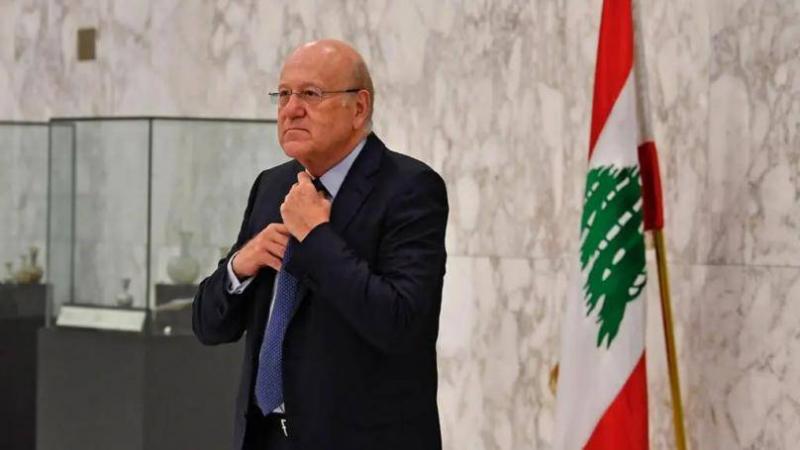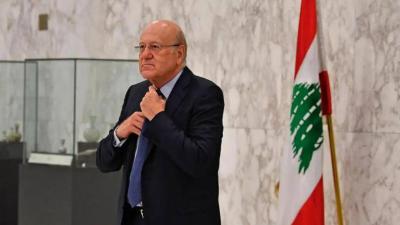President Najib Mikati, who has been tasked with forming a government while still in a caretaker role, has received a modest number of votes that did not exceed expectations. As anticipated, the votes reflected what the blocs had announced in the days leading up to the consultations, with two notable exceptions: the first was MP Ashraf Rifi, who declared his boycott of the consultations, and the second was MP Jihad al-Samad, who named former Prime Minister Saad Hariri, stating, "In light of the fragmentation in the Sunni leadership and the imposed decision on President Hariri, whom I consider to be the most representative, I named Saad Hariri to form the government."
Here is the vote distribution:
- President Najib Mikati: 54 votes
- Ambassador Nwef Salam: 25 votes
- President Saad Hariri: 1 vote
- Dr. Rawa Halab: 1 vote
- No nomination: 46 votes
The consultations began with Deputy Speaker Elias Bou Saab, who confirmed, "The phase we are going through is exceptional and requires us to think about how we will overcome the situation to facilitate what the Lebanese are requesting." He added, "The options are clear, and the greatest opportunity lies with Mikati, but due to the lack of clarity in the formation phase, I decided not to name anyone." He urged the designated president to expedite the formation of a government because the situation cannot bear delays and called for flexibility in dealings.
For his part, MP Walid Ba'arini, on behalf of the "National Moderation Bloc," named President Najib Mikati to lead the government, hoping that the formation period will not be long. Meanwhile, MP Sami Gemayel reiterated that, "Based on the election results and the desire of the Lebanese for change, we tried to act as an opposition party by proposing a Prime Minister with a different vision for managing the crisis, which is Nwef Salam." Gemayel, speaking on behalf of the "Kataeb Bloc" after the parliamentary consultations, stated, "We hope that we do not fall victim to the reality of not forming a government before the presidential election, and we must work to form it because the country cannot bear more delays."
MP Taha Najji mentioned that he and MP Adnan Traboulsi nominated President Mikati. MP Fred Khatib, representing the "Independent National Bloc," indicated that "the bloc held a meeting and extensively discussed the issue of naming the Prime Minister," stating, "After consultations, we decided to name President Najib Mikati." He added, "Many Lebanese aspire to new faces and a new approach, but ultimately the national interest requires the formation of a government as soon as possible, and Mikati has the best chance of doing so," calling on "all political forces to extend their hands, open up, and move away from political alignments."
The "Democratic Gathering Bloc" announced its nomination of Ambassador Nwef Salam for Prime Minister. MP Taymour Jumblatt, on behalf of the bloc, stated, "Our only request is for the officials to facilitate the formation of a government that we will not participate in but will assist in forming."
MP Imad al-Hout announced the naming of President Najib Mikati to form the government "with some notes on the performance of the current government," while MP Mohammad Raad emphasized that "Lebanon today needs a government more than ever to manage its interests, and in crises, realism and national interest require overcoming all obstacles to form a government."
Speaking on behalf of the "Loyalty to the Resistance Bloc," Raad noted, "We named President Najib Mikati to form the government, wishing him success and for the country to recover and stabilize." MP Michel Moawad, representing the "Northern Confrontation Bloc," confirmed the nomination of Nwef Salam for Prime Minister, stating that "between not naming anyone or naming another person who increases the opposition's fragmentation, we consider that naming Salam is the best option to confront the system."
Moawad mentioned that "the opposition cannot remain fragmented, obstructing the ability to effect change, which will turn us into a powerless protest force." He called on the opposition, stating, "We cannot be a force for change unless we agree and understand on essential and critical responsibilities, and if we continue like this, we will bear responsibility just like the system."
The "Strong Republic Bloc" announced that it would not nominate anyone for the government. MP George Adwan, on behalf of the bloc, stated, "We did not name anyone for the government because we have tried as a bloc during the past period to gather the forces that agree with us, particularly regarding sovereignty, to have a unified stance in naming a Prime Minister, but unfortunately, we did not succeed." He added, "We were presented with two names and did not choose President Najib Mikati because we do not agree with him on the program, especially regarding the formation of national consensus governments. As for Ambassador Nwef Salam, whom we previously named, the program was clear, but afterwards, there was no communication with him, and we expected him to initiate contact with us to clarify his stance on the program."
MP Jamal al-Sayyed mentioned that he did not name anyone for the premiership, considering that "the elections provided an opportunity for people to initiate a political coup, but they reinstated the same structure, and they must bear responsibility for that," adding, "What is happening will not help the country or the people out of the crises."
MP Fouad Makhzoumi announced that he did not name anyone for the premiership, "because the two proposed options do not represent his conviction nor that of his voters." Makhzoumi stated, "Nwef Salam had no stance on the key issues such as arms, and having someone imposed from abroad for the premiership is not what we wish, while Mikati represents the system, and reassigning him returns it; if there had been unity of opinion on Salam's name, we would have named him."
MP Hasan Murad stated that due to the critical phase and the deteriorating general conditions, he named President Najib Mikati "to continue fulfilling his duties during this period, hoping he can achieve something."
MP Jean Talouzian emphasized that he named President Najib Mikati for several reasons, the most important being the need for a Prime Minister and because this government will have a short lifespan; it is preferable not to bring in a completely new government. MP Osama Saad confirmed that the destruction in the country is significant, reflecting the failure of the rulers, and that a failed ruler should depart rather than remain, stating, "Today, we are faced with new political blockages and deepening collapse." He added, "I did not name anyone for the premiership, and concerning today's challenges, the failures are returning amidst the ruin of institutions at a time when Lebanon needs a different trajectory."
MP Abdul Rahman Al-Bizri announced that he did not name anyone for the premiership, "due to our conviction that the reform project is not yet completed." MP Michel Daher stated, "It is known that the result will be in favor of Mikati, and my objection to him is regarding the recovery plan; therefore, I will not carry my conscience by renaming him."
MP Jihad al-Samad named President Saad Hariri, saying, "In light of the fragmentation in the Sunni leadership and due to the decision imposed on President Hariri, whom I consider the most representative, I named Saad Hariri to form the government."
MP Naim Efram emphasized that "it is essential for Najib Mikati to continue his work, but we hoped for greater consensus." Efram, speaking on behalf of the "Human Project Bloc," stated, "We decided to give MP Jamil Aboud's vote to Mikati, and I abstained from naming anyone." Additionally, MP Firas Hamdan, representing the change deputies, announced that 10 of them nominated Nwef Salam, while 3 abstained from naming anyone.
Hamdan stated, "We began our conversation with President Aoun by reminding him that 80% of Lebanese are below the poverty line and that the rights of the Lebanese people are now available only to a small few. From this standpoint, we said it is unacceptable to continue with the same approach and faces," adding, "We hold the system responsible for the accelerating collapse, and our confrontation continues within the council and soon in the streets."
For his part, MP Abdul Karim Kabara stated that he named Mikati, "whom I believe is the most capable of leading this phase; if things continue this way, 'God help the country.'" Similarly, the "Development and Liberation Bloc" named President Mikati "in connection with the approach that should be followed by the government, especially regarding upcoming challenges."




